Symposium 2025
Review: A special industry gathering in our anniversary year
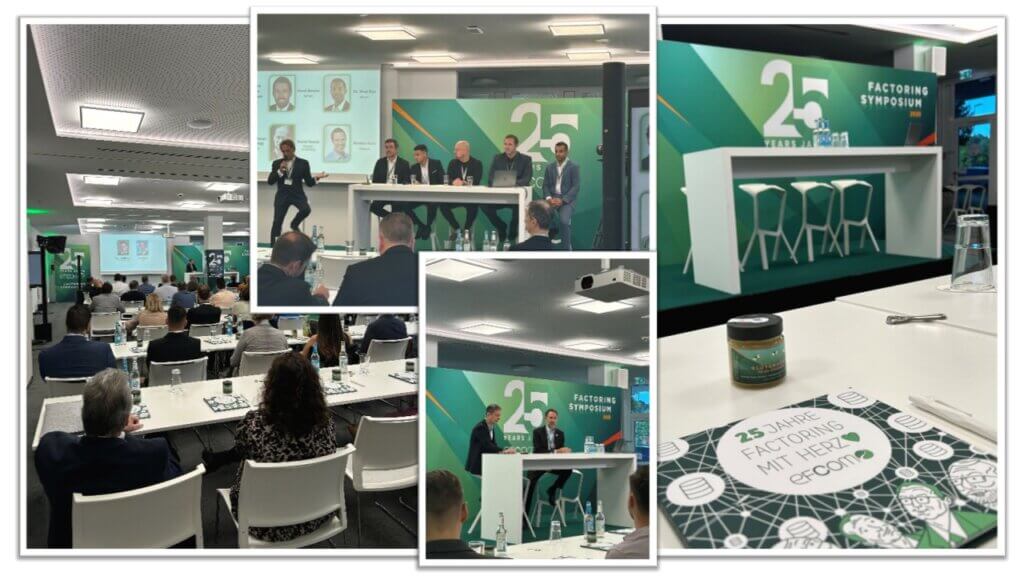
Numerous guests and speakers take part in the anniversary symposium
Exciting panels on current topics and new efcom software features
Culinary evening dinner in Frankfurt's Westhafen
Live interview: When two long-standing experts meet
International guests included Michael Bickers, Managing Director of BCR Publishing in London, and Neal Harm in his role as Secretary General of the FCI, based in Amsterdam. Both have been involved in the factoring world for many years and are familiar with the ups and downs, opportunities and risks that exist in the industry – not only regionally, but also globally. The exchange between the two in the form of an interview, with Michael asking the questions and Neal providing the answers, was correspondingly exciting. On the one hand, the discussion focused on the development of factoring worldwide: here, constant growth can be observed, especially in many transition countries, even when compared to the respective changes in GDP. On the other hand, the influence of geopolitical developments was discussed. According to Neal Harm, it is better to keep an eye on the long-term movements of trade flows (China-South America, China-Africa) rather than focusing solely on short-term disruptions (US trade dispute).
Another topic of discussion was the impact of new technologies on factoring. Digitalisation has made commercial processes much leaner and therefore faster. This increase in efficiency has given SMEs better access to markets. Harm sees AI primarily as a tool for improving data usage and interpretation rather than as an aid to the final financing decision. The use of AI presents both opportunities and risks in the form of fraud. The topic of education was also discussed. Organisations such as FCI are doing important groundwork here to make the idea and concept of factoring and supply chain finance understandable.
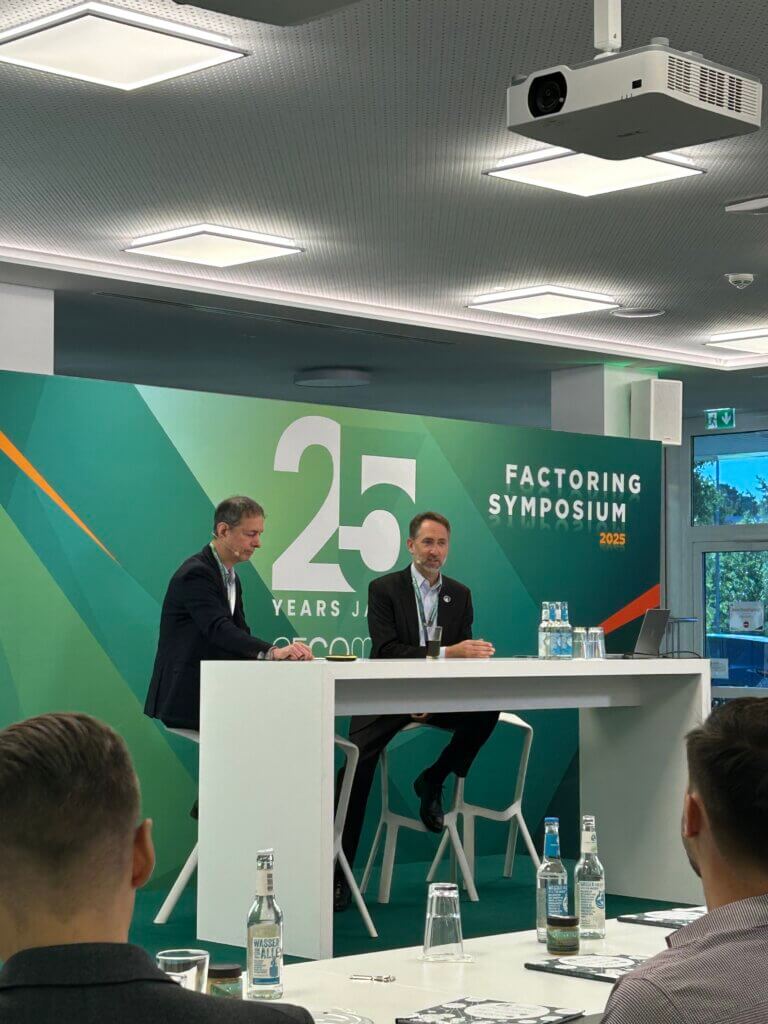
Left: Michael Bickers, right: Neal Harm
Panel ‘Risk’: Law, customers, debtors and regulations
The panellists included efcom CEO Arnulf Romann, Christian Faber from the law firm Bette Westenberger Brink (BWB) and Jan Pieper, also from efcom. The aim of the panel was to examine the topic of risk from different perspectives and its development over time. Looking at the legal component, legal certainty can be cited as a particularly important factor. Without it, the development of factoring is limited. In addition, many countries around the world have prohibitions on assignment, which means that factoring is difficult to implement there. Subsequently, the customer risk was examined, which can have an enormous impact on the business operations of factoring companies, especially in today’s climate of increasing economic uncertainty. Here, the question was raised as to what extent existing purchasing rules would need to be adapted to the changed economic situation. This may also require a certain change in mentality within companies.
The fact is that the increasing number of insolvencies in Germany (on the customer and debtor side) is leading to uncertainty in dealing with receivables, as the risk of possible fraud is also increasing. The general risk profile has therefore changed significantly in recent years. It is advisable to train your own staff, review existing contracts and closely monitor business processes. When considering the factor of regulation, it was found that Europe has a highly complex but unharmonised system. This also makes it difficult for solution providers to serve the relevant markets and adapt to them. The DORA regulations apply throughout Europe. In addition, the so-called AML package is in the pipeline, which deals with KYC and reporting processes, among other things. Ultimately, cyber risks for companies are also increasing and must be minimised accordingly.
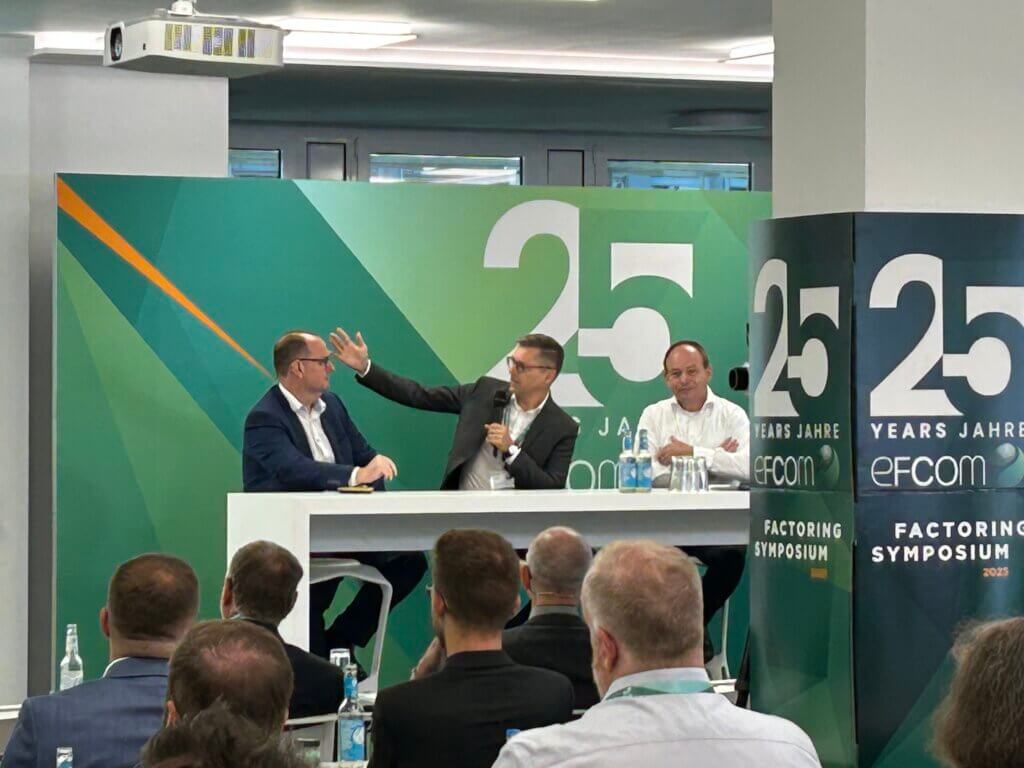
From left to right: Arnulf Romann, Christian Faber and Jan Pieper
Panel ‘Innovations’: From Islamic factoring to AI
Most of the speakers stood – or rather sat – on the podium during this panel discussion. They were: Horst Becker from KPMG, Abdelrahman El-Beltagy from efcom, Daniel Huszár from Huszarconsulting, Bastian Kurz from Adacor, and Dr Vinai Biju and Federico Avellán Borgmeyer, both also from efcom. The panel focused on new products and technological innovations. We would like to present just a few selected panel contributions here, and not in great detail, as this would go beyond the scope of this article.
Horst Becker, who oversees the implementation of solutions at KPMG, kicked off this panel discussion. His key message was: Be open to new ideas! This applies in particular to those who have enjoyed success in their respective business worlds using very specific strategies, but who find it difficult to embrace change – for example, the use of AI.
Next on the agenda was the topic of Islamic factoring, which has been occupying us as a solution provider for some time now. We have even developed a new Sharia-compliant product for this purpose – ifX. This made the facts and figures presented to the audience by our Islamic factoring expert and sales manager for the MENA region, Abdelrahman El-Beltagy, all the more exciting. For example, there are currently around 1,000 banks and financial institutions worldwide operating in the field of Islamic finance. Above all, however, not a single institution was affected by the global financial crisis in 2008. How can this be? There are numerous requirements and rules for Sharia-compliant banking, including the fact that charging interest is prohibited and that all financing must be covered by a real asset or service. Back to the figures: Islamic factoring is said to have enormous potential, with some forecasts predicting revenue growth of US$1 billion by 2030. In the field of Islamic finance, there are various types of contracts that can be used depending on the situation, including, for example, murabaha or musharaka.
The next presentation addressed the topic of the day – artificial intelligence (AI). Daniel Huszár presented his survey, which focused, among other things, on the use of AI in everyday working life. There currently appears to be a discrepancy between the number of users of AI tools and the number of officially approved tools in companies. This raises the question of shadow AI and how to deal with it. One of the main reasons for using AI tools in companies is to increase efficiency. AI is currently used primarily for research or summarising and writing texts and concepts. However, as there are also some barriers to the use of AI in companies, the recommendations at this point are: make shadow AI as visible as possible through workshops or hackathons and then scale successful examples.
According to Bastian Kurz from Adacor, the question is not whether and when we will use AI in companies, but how. After all, AI has long since become part of our everyday lives, both privately and professionally. A major issue with regard to the use of AI is data protection and data sovereignty. Or to put it bluntly: legal certainty is currently only guaranteed by German AI! What can be done in this regard? Bastian Kurz presented one example in the form of Adacor’s AI Workplace, a data protection-compliant AI solution that is closed to external access and thus offers a high level of security. Bastian Kurz then presented specific application examples from the HR and sales sectors: On the one hand, I can create an HR AI assistant who can, for example, answer questions about onboarding for new colleagues, thus saving a considerable amount of time. Another example is the import of data from business cards by an AI assistant, which can forward the data to the company’s own CRM system in a targeted manner. There are now numerous use cases in which AI assistants can efficiently perform tasks in combination with a data protection-compliant, protected environment.
Finally, Dr Vinai Biju presented the current status of our own AI tool, CubX. Among other things, he once again highlighted the difference between risk assessment based on historical data (heuristics) and forecasting using LM models. In the latter case, the following criteria can be used for a negative early warning, for example: developments in credit notes, direct payments, partial payments, debtor concentration or goods disputes. All this information can be incorporated into the model in order to make a reliable statement about possible developments in the future.
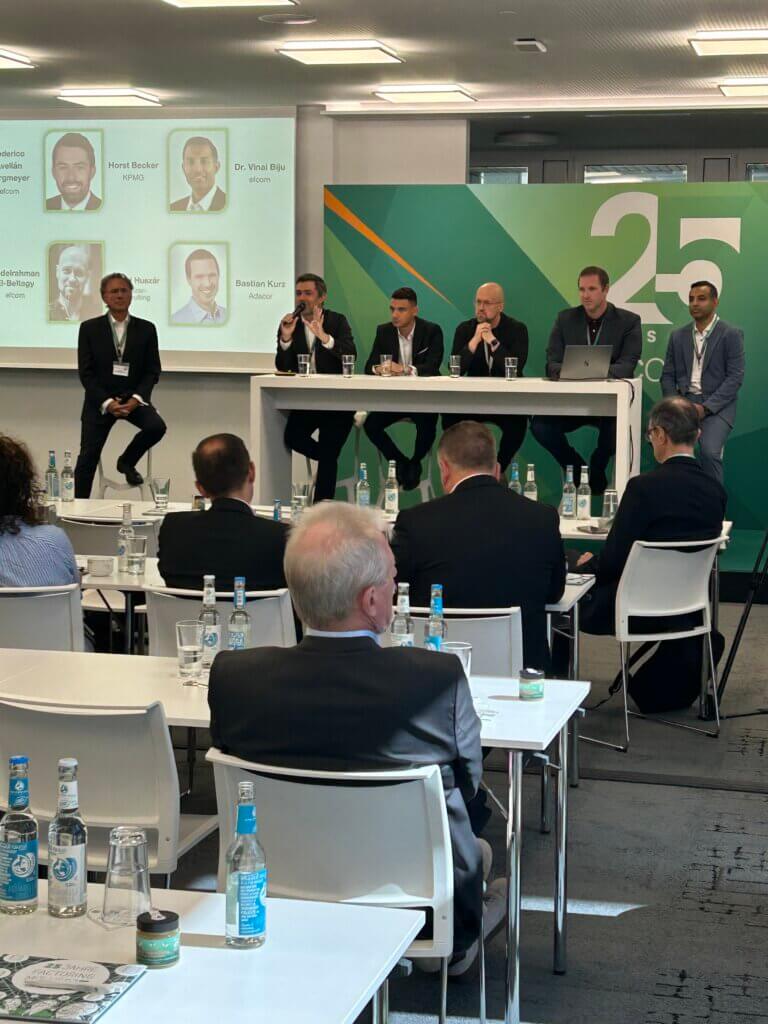
From left to right: Federico Avellàn Borgmeyer, Horst Becker, Abdelrahman El-Beltagy, Daniel Huszár, Bastian Kurz, Dr. Vinai Biju
Panel ``Workflow``: Digital onboarding
When onboarding new customers, there are traditionally numerous ways to do so, but these are often still manual or paper-based. In his impressive presentation, Fabian Kammering from finstreet showed how potential efficiency gains can be achieved by introducing purely digital processes. These gains arise, for example, from avoiding media breaks, duplicate data entry or manual checks. The solution here is an application platform that can be used to digitally map all individual sales channels. This platform can cover virtually every conceivable process along an application path, right up to the final delivery of a digital contract ready for signature. It is important that you can and must define for yourself which criteria must be met for a ‘happy flow’ (ideal case) and at what point it becomes a ‘non-happy flow’. This is characterised by a relatively high degree of flexibility in the design of the digital process – with the aim of mapping the individual circumstances of the company as accurately as possible.
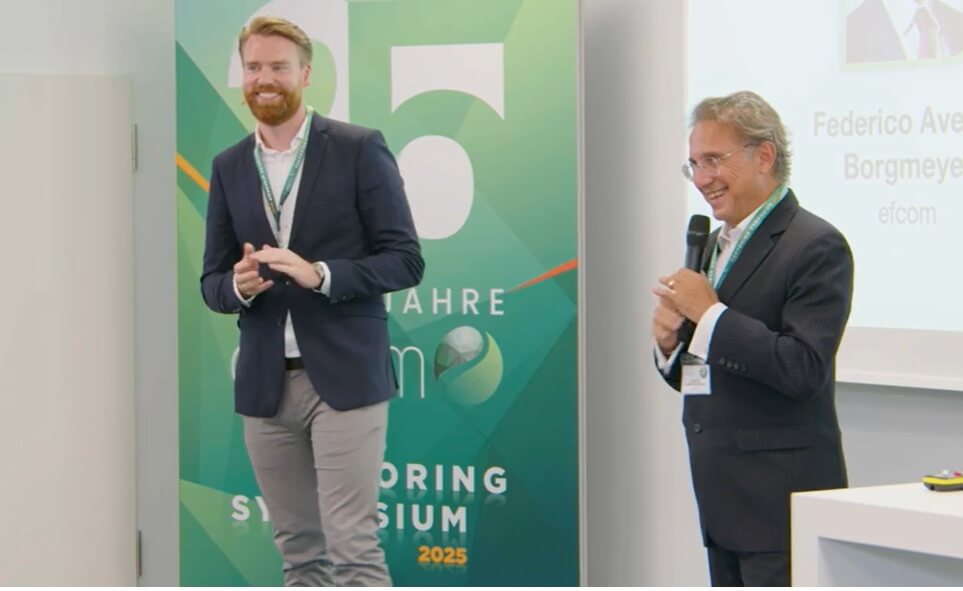
Left: Fabian Kammering von finstreet, right: Federico Avellàn Borgmeyer, efcom
Presentation cyber security
The last presentation dealt with the topic of cybersecurity. Here, many companies believe: ‘We’re far too small!’ or ‘Who would be interested in us?’ or ‘You can’t sell anything with security!’. However, according to Tom Hofmann, the fact is that even small, unknown companies can sometimes be driven into insolvency by targeted cyber attacks. The attacks are no longer carried out by kids in their basements, but by highly professional companies. These companies operate via criminal marketplaces where it is relatively easy to buy access data at minimal cost. In order to defend against such attacks and intrusions, the first question to ask is: How do we earn our money, i.e. what are our core processes that need to be protected? And finally: What should we actually do if it happens anyway? It is precisely this question that is often neglected and leads to even bigger problems in the event of a real attack.
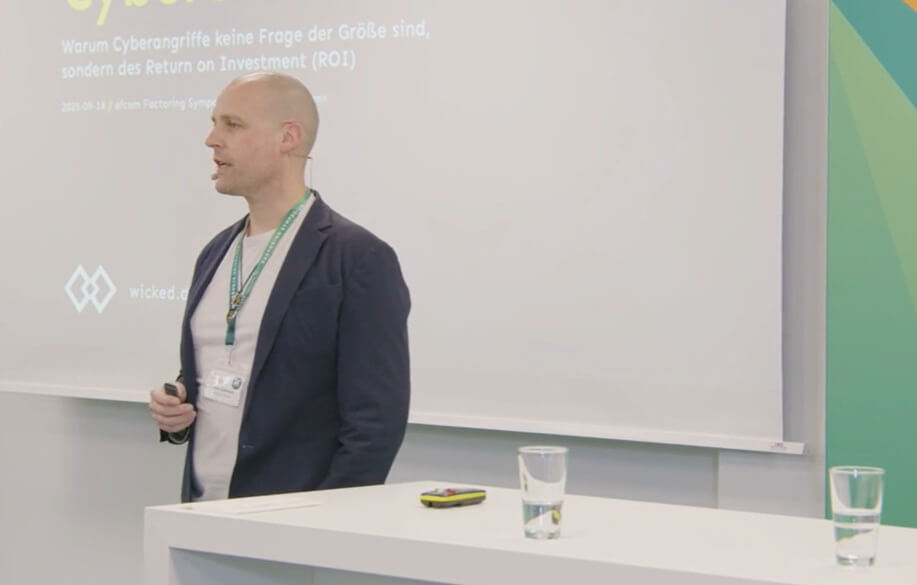
Tom F. Hofmann from wicked.design




